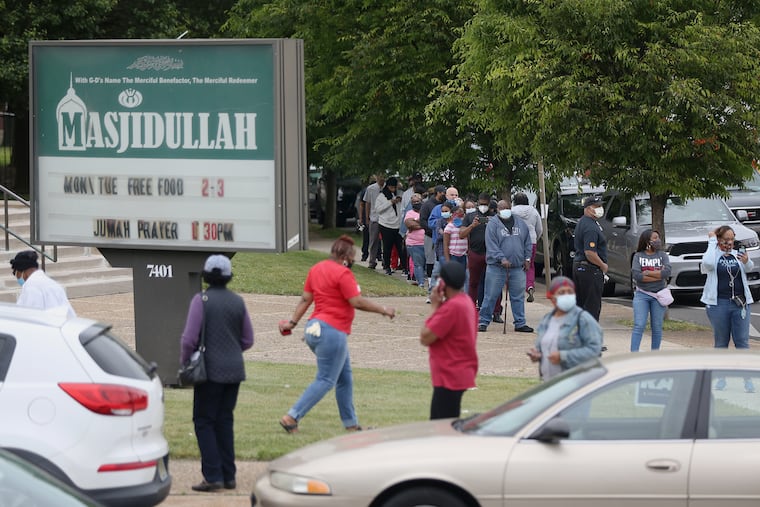Pa. NAACP sues state for changes to election law before November’s election
In a pandemic, the NAACP says, Pennsylvania’s electoral system disenfranchises voters, particularly black and Hispanic ones.

The Pennsylvania NAACP sued the state Thursday demanding an overhaul of the electoral system before November because, it said, the system in place for the June 2 primary was not equally accessible and disenfranchised black and Hispanic voters.
Among the changes the civil rights group seeks are stricter limitations on how many polling places a county can close, better notice of changes to locations, in-person early voting, automatic sending of mail ballot applications to all voters, and universal use of hand-marked paper ballots at polling places.
To adapt to the coronavirus pandemic in the primary, voting places were sharply limited in many counties and officials were overwhelmed by applications for mail ballots and not able to process them quickly. The changes the group is seeking are necessary, it said, because most epidemiologists expect the pandemic to continue in the fall. On June 2, voters who went to the polls had to risk their lives and health — while those who tried to vote by mail were not always able to do so, the NAACP Pennsylvania State Conference said.
» READ MORE: Tens of thousands of Pennsylvania mail ballots were turned in after the deadline. November could be worse.
“As the primary election made clear, many Pennsylvanians have been burdened by the hardships of voting in a pandemic under Pennsylvania’s current scheme. Still, these burdens were not, and in the future will not be, shared equally among Pennsylvania voters. … [W]hile some voters can vote burden-free, African-American and Latino voters are more likely to face an unacceptable and unnecessary risk to their lives and health,” the suit reads.
» READ MORE: The Philadelphia voters most likely to vote in person — or not at all — live in coronavirus hot spots
In particular, the NAACP pointed to mass closures of polling places in some counties, including Philadelphia, last-minute changes to polling places that caused confusion among voters, touchscreen voting machines that could have spread the coronavirus, and mail-ballot deadlines thousands of voters were unable to meet.
“In short, the current voting regime needlessly permitted the crisis to disenfranchise the voting rights of Pennsylvanians during the primary election. Absent judicial intervention, there is no reason to believe things will be different in the fall,” the suit says.
The lawsuit names Kathy Boockvar, the secretary of state, and Jessica Mathis, director of the bureau of election services and notaries, as defendants. The Pennsylvania Department of State declined to comment.
» READ MORE: The Pa. primary wasn’t a disaster. But it showed there’s work to do before November
This year’s elections were already poised to be complicated because of increased turnout due to the high-stakes presidential race, new voting machines that in most counties have only been used once or twice, and changes to election law that now allow any voter to vote by mail.
Then came the coronavirus pandemic, which fueled a surge in mail voting and made in-person voting risky and harder for county officials to staff and run polling sites.
» READ MORE: Pennsylvania’s primary election results are finally in. Here’s what they mean for November.
Several lawsuits challenged the state’s electoral system, mostly mail ballot deadlines so tight they can disenfranchise voters who request ballots at or near the legal deadline. Those lawsuits were largely unsuccessful, though in the end Gov. Tom Wolf extended the deadlines for six counties by executive order. Others received extensions from their local courts.
Kevin Greenberg, a Democratic election lawyer in Philadelphia who is not involved in the suit, urged the state legislature to make changes for November.
“I would prefer — I think everybody involved in elections would prefer — if the legislature would fix this, which would take a dramatic action to make it easier for people to vote remotely in the upcoming election,” he said.
The Republican-controlled legislature has in some cases been willing to work with Wolf, a Democrat, to change election laws, as they did in March to pass emergency legislation postponing the primary and changing some rules. At other times, there has been partisan gridlock on voting issues.
“We unquestionably have the kind of emergency situation that makes judicial intervention to protect the constitutional right to vote a real and important possibility,” Greenberg said.
» READ MORE: Pennsylvania is getting a different kind of ‘early voting’ in time for the 2020 election
The plaintiffs know they’re asking for a lot. That’s in part because multiple parts of the system require fixing, said Sozi Pedro Tulante, a former Philadelphia city solicitor and partner at Dechert LLP who is leading the lawsuit. (Dechert and the nonprofit Free Speech for People are representing the NAACP.)
“We’re looking at the entire system, the entire machinery of how we do elections,” he said. “The harm that we’re alleging, in conducting a general election during a pandemic, is so broad, we want the relief to be broad enough to cure that harm.”